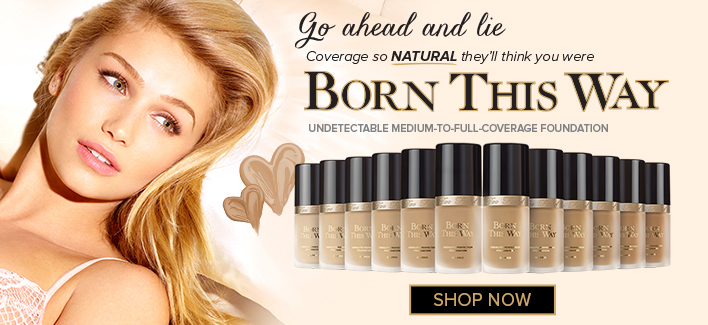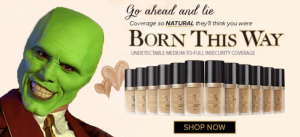
All it takes is a visit to the internet or a trip to the nearest city to realize that this type of advertisement is nothing short of typical in the beauty industry. It is a textbook example of a beauty company that attempts to persuade women to abandon their unique individuality and chase conformity to a narrow and unrealistic beauty standard for the sake of the company’s sales. In this particularToo Faced makeup advertisement, in bold cursive, the words ‘Go ahead and lie’ can be found across the top of the advertisement. This choice of wording implies that women are not enough and plays on common aesthetic insecurities that encourage women to reject a real view of beauty and accept a superficial beauty that can, and should be attained through this particular product. By the same token, this advertisement employs the word “coverage” to further enforce it’s subliminal message that women are inadequate and require ‘coverage’ of their natural skin. While I believe that it’s okay for women and men alike to want to enhance their appearance sometimes, it is problematic that the sole focus of facial enhancement is on females. While I can appreciate the focus on targeting the makeup industry’s main consumers – females, I wholly reject the marketing tactics that are employed to sell their product that ruthlessly enlarges a sexist norm and perpetuates the objectification of women.
Essentially, this advertisement pressures women to believe that our natural selves ought to be masked with ‘medium to full’ coverage in order to achieve the westernized beauty standard. Even a simple tweak in wording to shift the focus of makeup products away from covering up our insecurities to emphasizing and enhancing an individuals best facial features would move society in a direction that would inspire a generation of youth that embraces authentic self-love and confidence. Finally, no advertisement in the beauty industry is truly complete without some sort of female sexualization and Too Faced did not leave this box unchecked with it’s choice of lacy lingerie for its model. This sexual objectification in conjunction with finely tuned photoshop not only subjects women to unrealistic beauty standards but also perpetuates sexist and misogynistic attitudes within society.

The problem that my culture jam attempts to illustrate is the injurious social message described above that has become the dominant standard for the majority of beauty advertisements. Advertisements such as this one endeavour to alter our perception of beauty and eliminate our distinction between real and ‘idealized’ beauty. This culture jammed version of the Too Faced foundation advertisement brings to light the idiocy of the physical standards that surround us by comparing the product to the movie The Mask. In this iconic film, Jim Carrey transforms from a timid bank clerk to a supernatural playboy that exudes charm and confidence all thanks to a mask. By comparing The Mask to this product, we uncover the laughable expectation for these types of products to change our lives. By relating the use of an animated mask to this makeup product, we poke fun at the faulty promise to deliver “full coverage” that will, as the advertisement implies, change your life just as the mask did for Jim Carrey. I considered dramatically altering the text to further expose the advertisements bizarre intentions but I believe that in this case, less is more and the subtle change is effective. By leaving the text largely unchanged, the message in the culture jammed version of the advertisement is emphasized. It produces a natural sarcasm for the viewer when reading the original text in the culture jammed version, giving the advertisement a whole new meaning and accentuating the absurdity of this products promise. By slightly altering a single word from “foundation” to insecurity” to create the statement “undetectable medium-to-full insecurity coverage”, we overtly expose the outlandish intention of this advertisement. Ultimately, this culture jam aspires to invoke an awareness of the unequal gender expectations while exposing the innately wrongful objectification of women in a deeply flawed industry. Further, the aim of this culture jam is to promote the value of unique beauty and individuality while recognizing and rejecting unrealistic beauty standards.